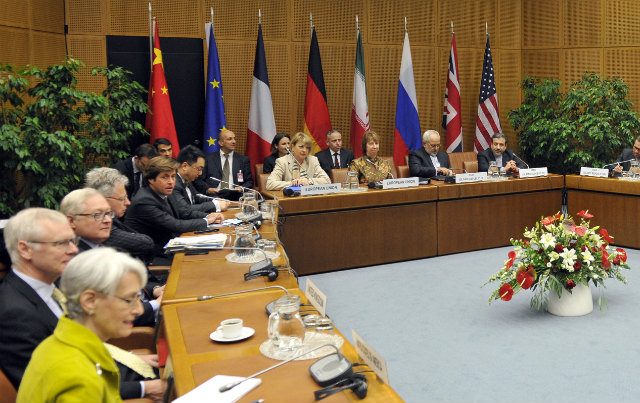SUMMARY
This is AI generated summarization, which may have errors. For context, always refer to the full article.

The fiendishly complex accord they want to strike is aimed at finally resolving a standoff that for years has been threatening to escalate out of control.
In essence the deal would see Iran scale down its nuclear program in order to ease fears it might make an atomic bomb. In return painful UN and Western sanctions would be lifted.
“All that is required is a sober appreciation of the realities faced and a serious calculation of alternatives,” Iranian Foreign Minister Mohammad Javad Zarif said in the Washington Post Friday, June 13.
But the last round of talks, the fourth, in Vienna in May between Iran and the five permanent members of the UN Security Council plus Germany appeared to hit major problems.
Instead of beginning the drafting of the deal as hoped, Iran’s chief negotiator said “no tangible progress” was made and Western officials spoke of “huge” gaps and a lack of “realism”.
“There is still lots of work to do. There are glimpses of outlines of solutions on different issues but it is all very fragile,” a Western diplomat said Friday.
“On the more important issues, there haven’t even been glimpses of solutions,” the envoy said, in particular uranium enrichment and the duration of the hoped-for accord.
In an effort to bridge the gaps ahead of Monday, Iranian negotiators in recent days held bilateral meetings with US and French counterparts in Geneva and with the Russians in Rome. (READ: Iran, US hold direct talks in Geneva for nuclear deal)
There was no indication of whether any progress was made in these gatherings, although Moscow’s pointman Sergei Ryabkov said “important work” was done by the Iranians with the US and French.
Different ballpark
The “main issue” is uranium enrichment, a process which can produce nuclear fuel but also the core of an atomic bomb, the Western diplomat said Friday.
French Foreign Minister Laurent Fabius said Tuesday, June 10, that the West wants Iran to slash the number of centrifuges – the machines that enrich – to “several hundred” from the current 20,000.
Iran on the other hand wants to massively increase the number of centrifuges, saying it needs them to produce the fuel for a future fleet of civilian nuclear plants. (READ: Iran will ‘do its best’ to secure nuclear deal: Rouhani)
But the West says that such facilities are years if not decades away from being built, fearing that Iran’s real aim is to enrich uranium for a bomb – something Iran denies.
“We are not even in the same ballpark,” said Fabius. “Wanting hundreds of thousands of centrifuges is pointless unless you want the bomb.”
“It is my view that any deal with Iran must demand significant dismantling of Iran’s nuclear infrastructure,” Robert Menendez, chair of the US Senate Foreign Relations committee, said Thursday, June 12.
Extra time
Under an interim deal struck in November, Iran agreed to freeze certain nuclear activities for a period of six months in return for minor sanctions relief.
This period comes to an end on July 20 and Zarif said Friday he was “reasonably confident” a deal could be achieved by then. But the six-month deal is renewable if needed.
In view of the difficulties and the short amount of time left, experts believe that both sides may already be discussing such a possibility. (READ: Nitty-gritty time for Iran nuclear talks)
“I imagine those conversations have already started,” Ray Takeyh, a former senior advisor on Iran at the US State Department, told Agence France-Presse (AFP).
An extension, particularly of another half-year, is not necessarily easy to agree, however.
US President Barack Obama would also much prefer to get a deal by July 20 in order to fend off accusations ahead of midterm elections in November that Iran is merely buying time. (READ: Iran, US announce surprise nuclear talks)
But Kelsey Davenport from the Arms Control Association believes that Washington should not shy from extending if necessary, since the alternative – no deal – is far worse.
Such a “failure … would result in an unconstrained Iranian nuclear program and possible military action,” she told AFP. – Rappler.com
Add a comment
How does this make you feel?
There are no comments yet. Add your comment to start the conversation.